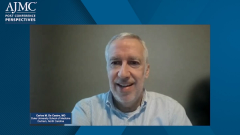
Unmet Needs Surrounding PNH
In his closing thoughts, Dr De Castro provides a final overview of the ASH conference, highlighting updates in PNH treatment.
Carlos M. De Castro, MD: I’d love to say we need more studies, studying issues one at a time in a randomized style. That’s very hard to do when you have a rare disease, just because there are not that many patients out there. So, it makes it very hard to study some of these issues. The other way we can sometimes study them is through registry databases. And there are at least 1 or 2 PNH [paroxysmal nocturnal hemoglobinuria] registries out there, where we can take a large approach to understanding data that are there. There are some inherent dangers to using registries for data collection, but overall, it gives us a way to look at large numbers of patients with PNH.
There were more abstracts at this annual American Society of Hematology meeting than I’ve seen in quite a while. A lot of them have to do with some of the newer treatments that are out there. This includes some new C5 [complement component 5] antibodies, one of which is being combined with a small interfering RNA molecule. It’s a way of targeting C5 in 2 different directions or mechanisms. They are all exciting data; they all are very efficacious in terms of what they’re showing.
There are other drugs out there like a factor D inhibitor, called vemircopan, that is being developed. That’s even more effective than danicopan, which is another one out there. There were data presented on both of those. Factor D, again, with factor B is a way to block the alternative pathway. The advantage of factor D and factor B is that it takes less drug to inhibit them. And they aren’t amplified as much as say C3 is during that process. Hopefully, you won’t see as much breakthrough hemolysis, at least theoretically, that is the hope with these new drugs.
I think it’s a very exciting time in PNH. We have newer treatments out there that hopefully will be even more efficacious for the patients and more convenient for them to take as oral drugs. I think that’s all very exciting. It’s going to be interesting to see how we choose what patients need what drugs and decide how to best give them the best therapies.
Transcript edited for clarity.
Newsletter
Stay ahead of policy, cost, and value—subscribe to AJMC for expert insights at the intersection of clinical care and health economics.










